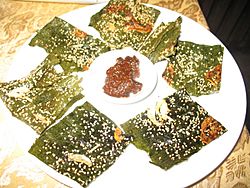Kaipen facts for kids

Spicy jaew bong sauce with kaipen
|
|
| Type | Snack |
|---|---|
| Place of origin | Laos |
| Region or state | Luang Prabang |
| Main ingredients | Green algae, garlic, vegetables, sesame seeds |
Kaipen (Lao: ໄຄແຜ່ນ, romanized: khai phaen) is a special snack from Laos. It is made from fresh water green algae. Other ingredients include garlic, different vegetables, and sesame seeds.
Contents
What is Kaipen?
Kaipen is a popular snack, especially in the city of Luang Prabang in northern Laos. It is a bit like the Japanese seaweed snack called nori. Kaipen is known for being full of vitamins and minerals.
How Kaipen is Made
Making Kaipen is a careful process. It starts in the dry winter months, usually from November to April. This is when the river levels are low.
Gathering the Algae
The main ingredient, a green algae called kai, is collected from the bottom of the river. After gathering, the kai is washed very well. Then, it is pounded for a few hours until it forms a paste.
Preparing the Sheets
The pounded algae is shaped into cubes. A special liquid is then poured over these cubes. This liquid is made from water and other flavors like tamarind.
Each cube is then flattened into a thin sheet on a plastic surface. These sheets are placed onto flat reed mats. On top of the algae sheets, sesame seeds are sprinkled. Sometimes, dried slices of garlic, tomato, and onion are added too.
Drying the Kaipen
The reed mats with the Kaipen sheets are then put outside. They are placed on a wooden frame to dry in the sun. This drying process takes at least seven hours. The sun helps to cook and preserve the Kaipen.
When finished, the Kaipen looks like a large, thin sheet, similar to nori. These dried sheets are then packed into plastic bags. This makes them ready to be sold and enjoyed.
How to Eat Kaipen
Kaipen tastes a bit like nori, but it has its own unique flavor. It can be slightly sweeter, a little bitter, and very fragrant.
Cooking Kaipen
The best way to eat Kaipen is to flash-fry it. This means cooking it very quickly in hot oil. When fried, Kaipen becomes wonderfully crispy. Many people enjoy it like a potato chip.
Kaipen Around the World
While mostly eaten in Laos, Kaipen has also reached other parts of the world. Since 2002, you can find Kaipen for sale in some markets in the United States.
Types of Algae Used
The specific types of algae used for Kaipen are usually identified as Cladophora sp. or Dichotomosiphon tuberosus. These are the scientific names for the green algae.
See also
 In Spanish: Kaipen para niños
In Spanish: Kaipen para niños
 | Dorothy Vaughan |
 | Charles Henry Turner |
 | Hildrus Poindexter |
 | Henry Cecil McBay |

